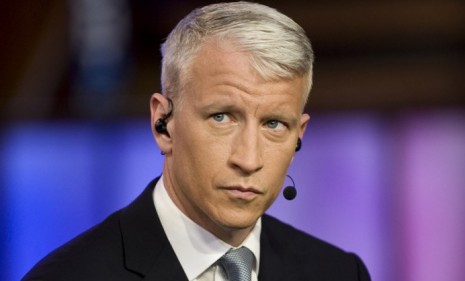Did Anderson Cooper take sides on Egypt?
The CNN anchor repeatedly told viewers the Egyptian regime was "lying." Some media critics say Cooper crossed the line

Anderson Cooper is under attack again — not from Egyptian thugs, but from his colleagues in the American media. Some are angry at the CNN anchor for repeatedly telling viewers that the Egyptian administration was telling "lies" in the run-up to the resignation of President Hosni Mubarak last week. The government, he said, is "lying to Egyptians and lying to the world." In response to accusations from viewers that he had lost objectivity after being attacked on the streets of Cairo, Cooper responded: "This is about the truth." Meanwhile, media critics have taken up the charge that Cooper "took sides" on Egypt. Is that fair?
Cooper's remarks were more comment than news: American TV anchors don't normally accuse government officials of lying, says James Rainey at the Los Angeles Times. But Cooper "made up for that, big time." He accused Egypt's leader of misleading the public 14 times in a single episode. Sure, Cooper was absolutely correct in his assessment — but his "unforgiving tone" came close to the "commentary-heavy approach" of Fox News and MSNBC.
"Egypt: CNN's Anderson Cooper on lies and the lying Egyptians who tell them"
The Week
Escape your echo chamber. Get the facts behind the news, plus analysis from multiple perspectives.

Sign up for The Week's Free Newsletters
From our morning news briefing to a weekly Good News Newsletter, get the best of The Week delivered directly to your inbox.
From our morning news briefing to a weekly Good News Newsletter, get the best of The Week delivered directly to your inbox.
Exposing lies is what journalists do: It's a journalists' job to "treat factually false statements as false," says Glenn Greenwald at Salon. Cooper was simply doing his job — identifying the lies of this corrupt regime, and describing them to his viewers. Allowing Mubarak to lie freely and without recourse would have been a far more egregious example of "taking sides." Instead, Cooper stood up for the truth.
"Journalists angry over the commission of journalism"
If only journalists told us when the U.S. government is lying: Wouldn't it be great, says Andrew Sullivan at The Atlantic, if "journalists actually used the world 'lie' to describe when the U.S. government lies." Not when it spins the truth — but when it "says something it knows is untrue and we can independently verify is untrue." It's time the media tell it like it is, no matter who is lying.
"In defense of Anderson Cooper"
A free daily email with the biggest news stories of the day – and the best features from TheWeek.com
-
 Bad Bunny, Lamar, K-pop make Grammy history
Bad Bunny, Lamar, K-pop make Grammy historySpeed Read The Puerto Rican artist will perform at the Super Bowl this weekend
-
 Political cartoons for February 2
Political cartoons for February 2Cartoons Monday’s political cartoons include ICE getting schooled, AI in control, and more
-
 Democrats win House race, flip Texas Senate seat
Democrats win House race, flip Texas Senate seatSpeed Read Christian Menefee won the special election for an open House seat in the Houston area